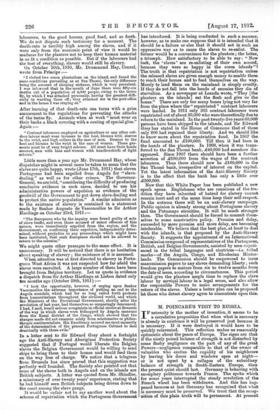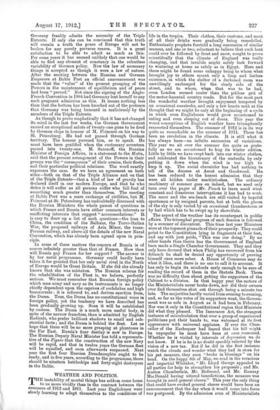M. POINCARDS VISIT TO RUSSIA.
IF necessity is the mother of invention, it seems to be a correlative proposition that when what is necessary is already in existence it will be preserved just because it is necessary. If it were destroyed it would have to be quickly reinvented. This reflection makes us reasonably optimistic about the peace of Europe. The signs are that if the nicely poised balance of strength is not disturbed by some flashy negligence on the part of any of the great Powers—negligence comparable to that of the owner of valuables who excites the cupidity of his neighbours by leaving his doors and windows open at night— or is not upset by a collapse of the subsidiary balance of strength in South-Eastern Europe, then the present quiet should last. Germany is behaving with exemplary politeness towards France. The spoke which for some years interrupted the steady revolution of the French wheel has been withdrawn. And this has hap- pened because at last Germany has recognized that what is necessary must be preserved. We trust that the recog- nition of this plain truth will be permanent. At present Germany frankly admits the necessity of the Triple Entente. If only she can be convinced that this truth will remain a truth the peace of Europe will not be broken for any purely perverse reason. It is a great satisfaction to be able to admit as much as this. For some years it has seemed unlikely that one would be able to find any element of constancy in the relentless variability of German policy. Now the law of necessary things is accepted as though it were a law of nature. After the meeting between the Russian and German Emperors at Baltic Port an official announcement was made that the "value" of the present grouping of the Powers in the maintenance of equilibrium and of peace had been " proved." Not since the signing of the Anglo- French Convention in 1904 had Germany lent herself to any such pregnant admission as this. It means nothing less than that the bottom has been knocked out of the pretence that Germany was being hemmed in maliciously by the members of the Triple Entente. As though to prove emphatically that it has not changed its mind in the last few weeks, the German Government caused an exceptional salute of twenty-one guns to be fired by German ships in honour of M. Poincare on his way to St. Petersburg. He had not passed through German territory. The honour pursued him, so to speak. He must have been gratified when the customary seventeen passed into twenty-one. M. Sazonoff, the Russian Minister of Foreign Affairs, in a statement to the Malin, said that the present arrangement of the Powers in their groups was the " consequence " of their armies, their fleets, and their particular political relations. The word exactly expresses the case. So we have an agreement on both sides—both on that of the Triple Alliance and on that of the Triple Entente—that a kind of law of gravity has declared itself in our modern Europe, and that he who defies it will suffer as all persons suffer who fall foul of something much greater than themselves. The meeting at Baltic Port was a mere exchange of civilities, but M. Poincare at St. Petersburg has undoubtedly discussed with the Russian Ministers the whole gamut of questions in which France and Russia have either common interests or conflicting interests that suggest " accommodations." It is easy to draw up a list of such questions—the loan to China, the condition of the Balkans, the Turco-Italian War, the proposed railways of Asia Minor, the trans- Persian railway, and above all the details of the new Naval Convention, which has already been agreed upon in prin- ciple.
In some of these matters the concern of Russia is of course infinitely greater than that of France. How then will Russia pay France for her support ? The answer is by her naval programme. Germany could hardly have taken it for granted that her only naval rival in the North of Europe would be Great Britain. If she did she already knows that she was mistaken. The Russian scheme for the rehabilitation of the Fleet is, we believe, perfectly serious. We must remember that Russian foreign policy which uses army and navy as its instruments is no longer chiefly dependent upon the caprices of archdukes and high bureaucrats : it is referred to, and derives sanction from, the Duma. True, the Duma has no constitutional voice in foreign policy, yet the tendency we have described has been gradually growing up. Soon it will be established by custom. The Duma is a much more useful body, in spite of the narrow franchise, than is admitted by English Radicals, who prefer brilliant shadows to small and sub- stantial facts ; and the Duma is behind the fleet. Let us hope that there will be no more grasping at phantoms in the Far East. Russia's finer destiny is now in Europe. The Russian Deputy Naval Minister has told a representa- tive of the Figaro that the construction of the new Navy will be rapid, and that in twelve years the German fleet will be equalled, and soon afterwards surpassed. Next year the first four Russian Dreadnoughts ought to be ready, and in five years, according to the programme, there should be nineteen battleships and forty-eight destroyers in the Baltic.







































 Previous page
Previous page